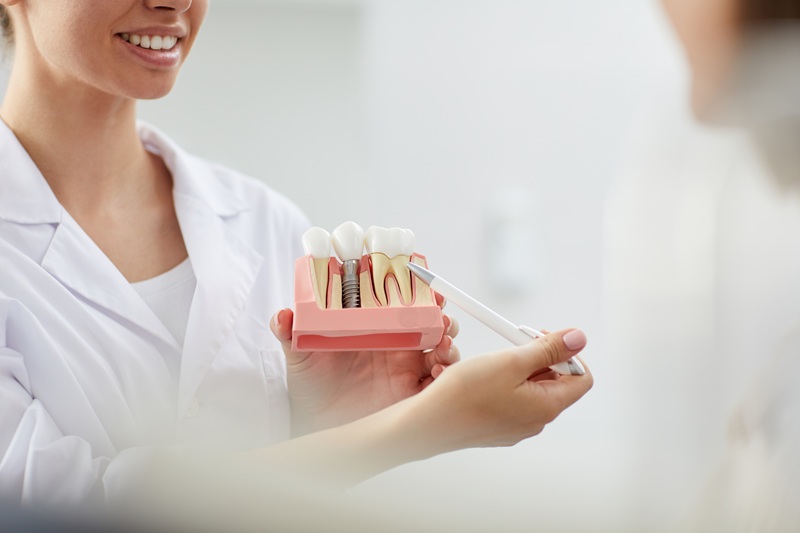Are Dental Implants Right for You?

Losing a tooth can affect more than just your smile. It can change how you eat, how you speak, and even how confident you feel. Dental implants have become one of the most popular and reliable solutions for replacing missing teeth.
But while implants offer many long-term benefits, they are not right for everyone who seeks to replace their missing tooth. Some patients need extra preparation before treatment, and for others, alternative options may be more suitable.
So, how do you know if dental implants are right for you? Let’s break it down.
How do Dental Implants Work?
Before we begin, let’s understand how dental implants work. A dental implant is a small titanium post that acts like an artificial tooth root. It’s placed into the jawbone where the natural tooth once was, and over time, the bone grows around it (a process called osseointegration), securing it firmly in place. Once healed, a crown, bridge, or denture can be attached, completing the restoration.
Implants are strong, stable, and designed to look and function just like natural teeth. They can replace one tooth, several teeth, or even a full arch of missing teeth using systems like All-on-4 implants.
But unlike natural teeth, which are living and can repair themselves to some degree, implants are not alive. As Dr. Melissa from Whitehorse Dental explains, “A natural tooth is like a living tree that’s able to heal and respond to stimuli. An implant is more like a wooden fence post. It doesn’t heal or respond to challenges the same way.”
That means implants need the right environment to thrive: healthy bone, clean gums, and consistent care.
Why the Right Environment Matters
Unlike natural teeth, implants don’t have nerves or blood vessels. Once they’re placed, they rely on the surrounding bone and gums to stay healthy.
That’s why at our clinic in Whitehorse Dental, we have high standards when it comes to candidates for dental implant procedures. Our dentist will only proceed when your mouth is in the best possible condition. If the environment is not ideal, such as having active infection, gum disease or poor cleaning habits, the implant might fail over time.
Dr. Melissa compares this to planting a post in the ground: “If the soil is soft or infected, the fence post won’t hold up. It’s the same with implants — they need strong, healthy bone and gum support to stay secure.”
Who is a Good Candidate for Dental Implants?
Now, if that’s the case, who is a good candidate for dental implants? At Whitehorse Dental, the first step before any dental implant procedure is to evaluate your implant candidacy, that is, whether your mouth and overall health provide the right foundation for long-term success.
Here are some of the key factors that determine if you’re a suitable candidate:
1. Healthy Gums and Bone
The bone in your jaw acts as the foundation for the implant. It needs to be strong and free from infection. If you have gum disease or bone loss, your dentist may recommend treatment of the gum disease or a bone graft before moving forward.
2. Good Oral Hygiene Habits
Dental implants can collect plaque and tartar just like natural teeth, sometimes even more. Dr. Melissa explains, “If you can’t clean your natural teeth properly, an implant can easily fail because bacteria can cause inflammation around it.”
Being able to clean around the implant every day is essential. Regular brushing, flossing, and dental check-ups will help keep the implant healthy and stable for years.
3. Non-Smoker or Willing to Quit
Smoking is one of the biggest risk factors for implant failure. It slows healing and increases the risk of infection. Smokers can still get implants, but quitting (or pausing) before and after surgery dramatically improves success rates.
4. Stable Medical Health
Conditions like poorly controlled diabetes can affect healing and increase infection risk. However, if your diabetes is well-managed, you may still be a good candidate. Your dentist will discuss your medical history and coordinate care if needed.
5. Commitment to Maintenance
Dental implants can last 10–20 years or more, but only if they are well cared for. If you’re willing to follow your dentist’s instructions and maintain good home care, you’re much more likely to enjoy long-lasting results.
The Bottom Line: Dental Implants Are a Partnership
So, are dental implants right for you?
That actually depends on how your dentist assesses your oral health. Dental implants are truly a good solution to address missing teeth by transforming your smile and restoring your confidence. However, their success depends on more than just the procedure itself.
They heavily rely on how you have been taking care of your teeth. That’s why a partnership between you and your dentist can make a difference by making sure you have a healthy mouth, proper daily care, and ongoing maintenance.
If your mouth is healthy, your gums are infection-free, and you’re committed to looking after your teeth, implants can be an excellent, long-lasting investment in your smile.
If you’re considering getting a dental implant in Blackburn, VIC, Whitehorse Dental can guide and help you understand if the procedure is right for you. For more information, schedule a consultation with our team today.
Frequently Asked Questions
- Who is a good candidate for dental implants?
You’re likely a good candidate if you have healthy gums, enough jawbone to support the implant, good oral hygiene habits, and stable general health. Your dentist will check all these factors before recommending treatment. - Who might not be suitable for dental implants?
People with active gum disease, untreated infection, or significant bone loss may not be ready for implants. Heavy smokers and patients with poorly controlled diabetes also face higher risks of implant failure. - Why do healthy gums and bone matter for implants?
Implants rely on the jawbone and surrounding gum tissue for support. Without healthy bone or gums, the implant can loosen or fail to integrate properly. That’s why dentists ensure the area is infection-free before starting treatment. - Can smokers get dental implants?
Yes, but smoking can greatly increase the risk of complications. It reduces blood flow to the gums, slows healing, and raises the chance of infection. Dentists usually recommend quitting before and after the implant procedure for better results. - Can people with diabetes have dental implants?
Yes, if their diabetes is well controlled. Poorly managed blood sugar levels can slow healing and increase the risk of infection, but well-managed patients can still be successful implant candidates. - What if I don’t have enough bone for dental implants?
If your jawbone has shrunk or weakened, your dentist may suggest a bone graft or sinus lift to rebuild it. Once the bone is ready, the implant can be placed safely. - How long do dental implants last?
With good oral hygiene and regular dental check-ups, implants can last 10–20 years or more. Their lifespan depends largely on how well they are maintained. - How do I care for dental implants?
Brush twice daily with a soft toothbrush, use interdental brushes, avoid smoking, and see your dentist for regular cleaning and reviews. Consistent care helps prevent plaque buildup and infection. - Are dental implants better than dentures or bridges?
Implants often last longer and feel more natural than dentures or bridges. They also help prevent bone loss and don’t rely on neighbouring teeth for support. However, the right option still depends on your oral health and lifestyle. - How can I find out if dental implants are right for me?
Book a consultation with your dentist. They’ll assess your gums, bone, and overall health, discuss the dental implant procedure, and determine if implants are suitable for you.



